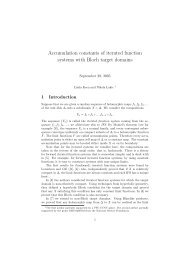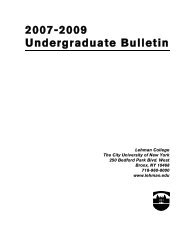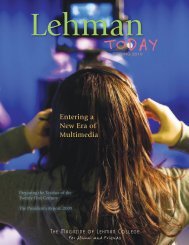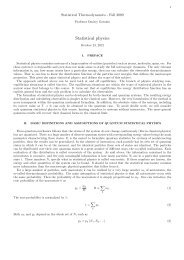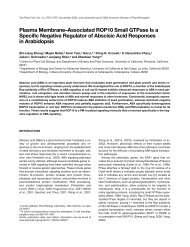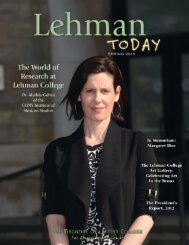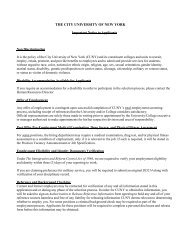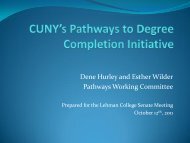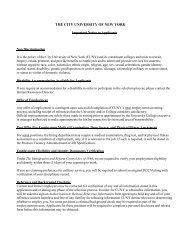Create successful ePaper yourself
Turn your PDF publications into a flip-book with our unique Google optimized e-Paper software.
There’s No Place Like Home:<br />
Angel Hernandez ‘09<br />
Helps Keep Bronx History Alive<br />
It was homesickness that first sparked Angel Hernandez’s (B.A.,<br />
‘09) interest in the history of the Bronx, and that interest quickly<br />
grew into a passion that has never left him. As the education<br />
coordinator for the Bronx Historical Society, he is now helping to<br />
introduce others to the little-known history of the borough.<br />
Hernandez’s family moved from the Bronx to San Diego when he<br />
was a child, but he missed his hometown so much that he spent<br />
hours in the local library, reading about the Bronx. From Jordan<br />
L. Mott’s (Mott Haven) invention of the modern stove to Leonard<br />
Jerome’s (Jerome Avenue) status as the grandfather of Winston<br />
Churchill, Hernandez was obsessed with learning more and more<br />
about the borough’s history.<br />
“These were some of the facts I learned as a kid that made me go<br />
‘wow’,” says Hernandez, whose family moved back to the borough<br />
when he was twelve, settling in the Soundview section.<br />
When Hernandez enrolled in <strong>Lehman</strong>, his interest in the study of<br />
people and data drew him to sociology, but a course with Bronx<br />
Historian Lloyd Ultan on the history of the Bronx set him on his<br />
current career path. “Not only is Angel intelligent, but he has the<br />
passion,” says Professor Ultan. “And because he has the passion,<br />
he has the impulse to find out information on his own, rather than<br />
just taking received material.”<br />
First appointed as Bronx Historian in<br />
1996, Professor Ultan has authored<br />
nine books and thousands of articles<br />
on the history of the borough—his most<br />
recent book is The Northern Borough:<br />
The History of the Bronx (Bronx County<br />
Historical Society, 2009). He was happy<br />
to take Hernandez under his wing, and<br />
the two quickly developed a strong<br />
rapport.<br />
Hernandez offered to help his professor<br />
with his research and eventually<br />
Angel Hernandez<br />
began volunteering at the Bronx Historical Society a few<br />
days a week. There, he worked on atlases, moved books, and<br />
performed any task needed of him. Professor Ultan suggested<br />
that Hernandez apply for the Society’s Peer Educator program,<br />
which he did. When the position opened up, Hernandez was<br />
thrilled that he was selected. As an educator, he leads walking<br />
and historic house tours, maintains the Society’s website, and<br />
oversees some marketing efforts.<br />
His most recent project is the Bronx Latino History project.<br />
“The mission is to highlight all Bronx Latinos who lived in<br />
the borough or made Bronx history, going back as far as the<br />
late eighteenth century,” Hernandez explains. The project will<br />
include exhibitions, publications, walking tours, and talks.<br />
<strong>Lehman</strong> Opened up a Whole New Career for<br />
María Caba ‘95 as a <strong>College</strong> Professor<br />
Professor María Caba owes her career to <strong>Lehman</strong> <strong>College</strong>, literally.<br />
She arrived in the Bronx from her native Dominican Republic in<br />
1989 and enrolled at <strong>Lehman</strong> two years later. She had a simple<br />
goal in mind: improving her English. “I could read and write a little,<br />
so I thought I’d take some English courses,” she says.<br />
But after taking a few classes, she was encouraged by her professors<br />
to think about getting her undergraduate degree, which she<br />
did, earning a B.A. in languages and literatures, specializing in<br />
Spanish, in 1995. In particular, she cites Professor Xavier Totti,<br />
who directed <strong>Lehman</strong>’s bilingual program at the time—he’s now a<br />
faculty member in the Latin American and Puerto Rican Studies<br />
Department—for pushing her to dream big. “I remember he asked<br />
me, ‘When are you going to go to grad school?’ I had never even<br />
thought of it,” she recalls.<br />
Professor Caba told her teachers that she did not have the funds<br />
to pursue a graduate degree. “It was Professor [Gary] Schwartz<br />
who told me that I could apply to grad school, and they offer you<br />
money,” she says.<br />
30 <strong>Lehman</strong> Today/<strong>Spring</strong> <strong>2011</strong><br />
Which is exactly what happened, helping her to<br />
eventually earn her M.A. and Ph.D. from Princeton<br />
University in Spanish literature. She is currently<br />
an assistant professor of Spanish in the Languages<br />
and Literatures Department at Pfeiffer<br />
University in North Carolina.<br />
María Caba<br />
“I always look back at my time at <strong>Lehman</strong> and<br />
remember that I went there to get more comfortable with the<br />
English language, and I ended up getting a whole new career,” she<br />
says. “I’ve had the opportunity to have a whole new life.”<br />
Now, she is in the midst of pursuing a second career: fiction writer.<br />
She recently published a short story, “Sortilegio” (which translates<br />
to “spell” or “charm”), in a Spanish-language journal and returned<br />
to <strong>Lehman</strong> this spring to give a reading of her new short work of<br />
fiction: “RD or How Grey Hair is Not Always a Sign of Wisdom.”<br />
“I’ve always written,” she says, “but now I think I’d like to pursue it<br />
more. It’s a lot of fun.”



